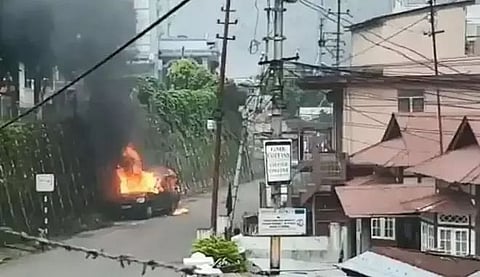
- Home
- Live Blog
- Breaking News
- Top Headlines
- Cities
- NE News
- Sentinel Media
- Sports
- Education
- Jobs

Outbreak of violence in the north-eastern States in the recent period is not just reflective of a State-specific law-and-order situation but also signals that the internal security situation across the region is experiencing new turbulence. Violence gripping Meghalaya's capital city -- Shillong -- on the Independence Day has set off alarm bells for States in the region as well as the Central government against acting like the proverbial ostrich. The prevailing situation in the hill State is an outburst of anger over the death of Cheristerfield Thangkhiew, a former general secretary of the proscribed militant outfit, HNLC (Hynniewtrep National Liberation Council), in a police encounter on August 13. Incidents of arson and stone pelting leading to the imposition of total curfew and suspension of Internet services in four districts of Meghalaya speak volumes about how delay in negotiation only makes peace more fragile. Miscreants hurling petrol bomb at Chief Minister Conrad K. Sangma's residence; stone pelting at two police stations and a CRPF camp expose lax security in the capital city. Meghalaya Home Minister Lahkmen Rymbui urged Chief Minister Conrad Sangma to relive him from his post over the incident in which the former HNLC general secretary was killed during a raid by the police and called for a judicial probe into the incident. The developments that unfolded indicated the severity of the situation. Meghalaya Cabinet's decision to constitute a judicial probe into death of the former HNLC general secretary was the need of the hour to ensure an impartial probe. The Cabinet also decided to constitute a 'Sub-Committee for Security & Law and Order' headed by the Chief Minister along with the Deputy Chief Minister and the Home Minister as panel members. It will look into aspects of law and order, possible future threats and also the overall functioning of Meghalaya Police. It is a timely decision to ensure the rule of law. Miscreants hurling petrol bomb at the residence of the Chief Minister and pelting stones at police stations pinpointed lax security and sounded alarm bell over the preparedness of the State Police force to handle the law-and-order situation. The August 13 incident was preceded by an incident of explosion of an IED (Improvised Explosive Device) in Shillong and the HNLC claiming responsibility is a standard tactics adopted by insurgent outfit to assert its presence as a force to reckon with. There is confusion over the peace process as regards to the HNLC. The outfit conveyed its willingness to hold talks with the government through a letter to the State government in January. However, the Central government objected to the conditions imposed by the HNLC and asked it to submit another letter without any preconditions. On its part, the State government clarified that it wants peace and also that it is open to hold dialogue with any organisation within the Constitutional framework of the Constitution of India, adding that the outfit must eschew violence and come forward for unconditional talks.
Lessons must be learnt from the ongoing peace process with the other insurgent outfits elsewhere in the region; and talks concluded and accords signed that peace is a must for creating a conducive atmosphere for negotiation. Ordinary people who are not the stakeholders in the armed conflict cannot be held hostage to a prolonged conflict situation. Bringing the HNLC to the negotiation table is important to prevent regrouping and recruitment of new cadres. When the COVID-19 pandemic situation has ravaged the national and state economies, peace cannot remain fragile. Spurt in insurgent violence, breakdown in law and order will scare away tourists from visiting Meghalaya, investments from flowing in the post-COVID period after the State gradually unlocks. It will have a cascading impact on the life and livelihood of the ordinary citizens besides pushing more people into penury. It is not just Meghalaya; violence erupting over disputes over inter-State boundaries in the region have made the law-and-order situation fertile for the disruptive forces to take advantage and indulge in acts of sabotage. If unchecked through concerted efforts by all States and the Central government, such forces inimical to India, will pose new threats to the internal security of the country in the region. The Central government as well as the State governments expediting development activities in the region is vital to draw more support of the people for peace efforts and also to mount pressure on all the armed groups to shun violence and negotiate. The space to fight for an imagined sovereign ethnic homeland is fast diminishing in the contemporary geopolitics and the armed outfits of the region -- realising this new reality -- is important to end the conflict situation. On its part, the government owes a responsibility to protect the lives and property of the ordinary citizens. The government must also carry out sustained efforts to initiate a peace process with HNLC -- which has become inevitable. The prevailing situation in the region calls for a comprehensive review of the internal security in the region. The clamour for peace must grow louder in the entire Northeast region.